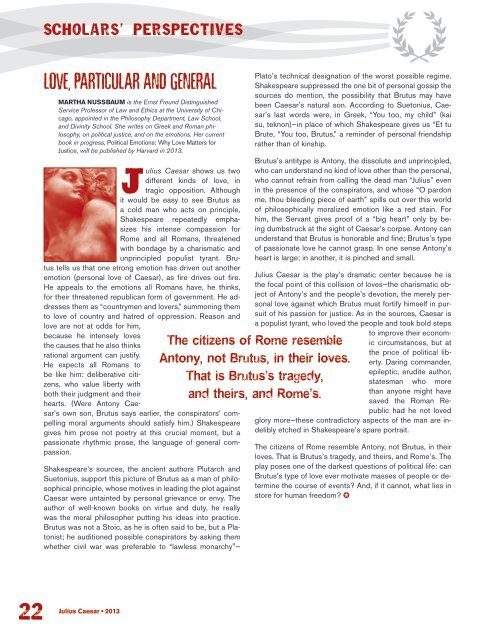Julius Caesar • 2013 - Chicago Shakespeare Theater
Julius Caesar • 2013 - Chicago Shakespeare Theater
Julius Caesar • 2013 - Chicago Shakespeare Theater
Create successful ePaper yourself
Turn your PDF publications into a flip-book with our unique Google optimized e-Paper software.
22<br />
SCHOLARS’ PERSPECTIVES<br />
LOVE, PARTICULAR AND GENERAL<br />
MARTHA NUSSBAUM is the Ernst Freund Distinguished<br />
Service Professor of Law and Ethics at the University of <strong>Chicago</strong>,<br />
appointed in the Philosophy Department, Law School,<br />
and Divinity School. She writes on Greek and Roman philosophy,<br />
on political justice, and on the emotions. Her current<br />
book in progress, Political Emotions: Why Love Matters for<br />
Justice, will be published by Harvard in <strong>2013</strong>.<br />
<strong>Julius</strong> <strong>Caesar</strong> shows us two<br />
different kinds of love, in<br />
tragic opposition. Although<br />
it would be easy to see Brutus as<br />
a cold man who acts on principle,<br />
<strong>Shakespeare</strong> repeatedly emphasizes<br />
his intense compassion for<br />
Rome and all Romans, threatened<br />
with bondage by a charismatic and<br />
unprincipled populist tyrant. Brutus<br />
tells us that one strong emotion has driven out another<br />
emotion (personal love of <strong>Caesar</strong>), as fire drives out fire.<br />
He appeals to the emotions all Romans have, he thinks,<br />
for their threatened republican form of government. He addresses<br />
them as “countrymen and lovers,” summoning them<br />
to love of country and hatred of oppression. Reason and<br />
love are not at odds for him,<br />
because he intensely loves<br />
the causes that he also thinks<br />
rational argument can justify.<br />
He expects all Romans to<br />
be like him: deliberative citizens,<br />
who value liberty with<br />
both their judgment and their<br />
hearts. (Were Antony <strong>Caesar</strong>’s<br />
own son, Brutus says earlier, the conspirators’ compelling<br />
moral arguments should satisfy him.) <strong>Shakespeare</strong><br />
gives him prose not poetry at this crucial moment, but a<br />
passionate rhythmic prose, the language of general compassion.<br />
<strong>Shakespeare</strong>’s sources, the ancient authors Plutarch and<br />
Suetonius, support this picture of Brutus as a man of philosophical<br />
principle, whose motives in leading the plot against<br />
<strong>Caesar</strong> were untainted by personal grievance or envy. The<br />
author of well-known books on virtue and duty, he really<br />
was the moral philosopher putting his ideas into practice.<br />
Brutus was not a Stoic, as he is often said to be, but a Platonist;<br />
he auditioned possible conspirators by asking them<br />
whether civil war was preferable to “lawless monarchy"—<br />
<strong>Julius</strong> <strong>Caesar</strong> <strong>•</strong> <strong>2013</strong><br />
Plato’s technical designation of the worst possible regime.<br />
<strong>Shakespeare</strong> suppressed the one bit of personal gossip the<br />
sources do mention, the possibility that Brutus may have<br />
been <strong>Caesar</strong>’s natural son. According to Suetonius, <strong>Caesar</strong>’s<br />
last words were, in Greek, “You too, my child” (kai<br />
su, teknon)—in place of which <strong>Shakespeare</strong> gives us “Et tu<br />
Brute, “You too, Brutus,” a reminder of personal friendship<br />
rather than of kinship.<br />
Brutus’s antitype is Antony, the dissolute and unprincipled,<br />
who can understand no kind of love other than the personal,<br />
who cannot refrain from calling the dead man “<strong>Julius</strong>” even<br />
in the presence of the conspirators, and whose “O pardon<br />
me, thou bleeding piece of earth” spills out over this world<br />
of philosophically moralized emotion like a red stain. For<br />
him, the Servant gives proof of a “big heart” only by being<br />
dumbstruck at the sight of <strong>Caesar</strong>’s corpse. Antony can<br />
understand that Brutus is honorable and fine; Brutus’s type<br />
of passionate love he cannot grasp. In one sense Antony’s<br />
heart is large; in another, it is pinched and small.<br />
<strong>Julius</strong> <strong>Caesar</strong> is the play’s dramatic center because he is<br />
the focal point of this collision of loves—the charismatic object<br />
of Antony’s and the people’s devotion, the merely personal<br />
love against which Brutus must fortify himself in pursuit<br />
of his passion for justice. As in the sources, <strong>Caesar</strong> is<br />
a populist tyrant, who loved the people and took bold steps<br />
to improve their economic<br />
circumstances, but at<br />
the price of political liberty.<br />
Daring commander,<br />
epileptic, erudite author,<br />
statesman who more<br />
than anyone might have<br />
saved the Roman Republic<br />
had he not loved<br />
glory more—these contradictory aspects of the man are indelibly<br />
etched in <strong>Shakespeare</strong>’s spare portrait.<br />
The citizens of Rome resemble<br />
Antony, not Brutus, in their loves.<br />
That is Brutus’s tragedy,<br />
and theirs, and Rome’s.<br />
The citizens of Rome resemble Antony, not Brutus, in their<br />
loves. That is Brutus’s tragedy, and theirs, and Rome’s. The<br />
play poses one of the darkest questions of political life: can<br />
Brutus’s type of love ever motivate masses of people or determine<br />
the course of events? And, if it cannot, what lies in<br />
store for human freedom? ✪




